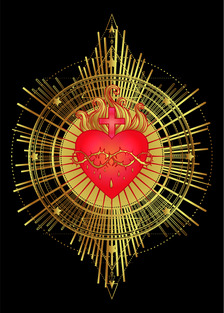
A platform that encourages healthy conversation, spiritual support, growth and fellowship

NOLACatholic Parenting Podcast
A natural progression of our weekly column in the Clarion Herald and blog

The best in Catholic news and inspiration - wherever you are!
Solemnity of the Body and Blood of Christ
-

By Father Thomas Hoisington
St. Martin Church, Caldwell, Kansas
Why did Jesus institute the Sacrament of the Holy Eucharist on the night before he died? Wasn’t his death on the cross good enough? Does the celebration of the Holy Eucharist add anything to what Jesus accomplished on Calvary? If not, why does the Church teach that it’s a mortal sin to miss Mass on a Sunday or Holy Day of Obligation (unless he has been given a dispensation)?St. Paul explains to the Corinthians what they were doing when the Eucharist is celebrated: “You proclaim the death of the Lord until He comes” (1 Cor 11:26). The Eucharist is a proclamation of the death of God in the flesh. At Mass, when the eucharistic prayer is offered, you are transported mystically and sacramentally to Calvary, on the day of Good Friday some 2,000 years ago.
Why did God give the Eucharist this focus? First, the death of Jesus is the price of our salvation. So, proclaiming the death of Jesus can help us to grow morally: both in our gratitude to God and so then in our expressions of charity.
However, the Eucharist reveals an even more profound reason why the death of Jesus is what the Eucharist proclaims. This reason is the most loving reason possible, though at first glance it might not appear so. You might flinch from God loving you this much.
God chose the death of Jesus as a means of man’s redemption so that man in his turn could enter fully into the saving mysteries of Christ. By contrast, imagine that God had chosen to purchase man’s salvation at a different price. Imagine that he set the price of man’s salvation as the destruction of 10 billion galaxies or that God snapped his fingers to release man from the bonds of sin and death. Or imagine that God purchased man’s salvation at the price of every drop of water in all the oceans and seas of the earth.
Where would that leave you (besides awfully thirsty)? It would leave you free and redeemed. But, it would not leave you with the ability to imitate our merciful God.
Every human being can die. This is why Jesus, at his Last Supper, willed to institute the sacrifice of the Mass as the way to Calvary: so that death would be our means of entrance into the saving mysteries of Christ. By receiving the Lord’s body and blood, we are able to be strong enough to die to our fallen selves, so as to discover our true selves. This may be simple, but it’s not easy.
Those who work in health or in hospice care have perhaps seen a person on his death bed who dies not from his disease, but from exhaustion – expending all energy not in living his life, but in avoiding his death. Sin occupies in our moral and spiritual life much of the same struggle. We don’t want to die. But by faithfully receiving the body and blood of our Lord Jesus Christ, we receive Jesus’ life, which gives us the strength to die; in fact, to accept death as the means of authentic life.
This death is a daily walk for the Christian disciple. Julius Caesar said (at least, in the words that Shakespeare put upon his lips), “Cowards die many times before their deaths./The valiant never taste of death but once” (from the play Julius Caesar, Chapter II, scene 2). Yet, Caesar was a pagan who met a gruesome end.
The Christian who follows Jesus faithfully dies not only many times, but each day. It’s this daily death, expressed as it is within our vocations and our sacrifices of time and talent for our neighbors, that gives us hope for the hour of our death, and allows us to embrace that hour in peace. The strength to walk the way of Christian discipleship – the way of love that leads to eternal love – comes to each of us through the Most Blessed Sacrament.
See www.reflectionsonthesacredliturgy.co




